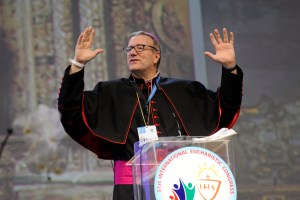The theology curriculum at Fenwick brings together all students to ponder important issues.
Determining the “best” is a notoriously complicated task. Is the best team the one with the most wins? The one with the most potential? The one that wins the last game? The one that won the most consistently?
This is no less challenging in classes. Are good students the ones with the best scores; with the clearest understanding of the material; or with the most original thought? What of those who ask the best questions? The list goes on.

As a teacher of morality, the task becomes even more complicated. Some students are standouts, not because they always get the questions right on the tests, but because they have lived through difficulty and grasp immediately the significance of moral issues. Others have a deep, personal commitment to faith and justice: They innately grasp what it means to be good and raise the level of discussion, but can’t always explain their convictions perfectly. Others still have a nuanced grasp of ideas and ace the tests but demonstrate no real commitment to enacting justice in their lives. Which of those is the best?
The great equalizer

All of this is to say that a theology class remains a great equalizer in Catholic education. Everyone, regardless of personal beliefs and upbringing, needs to wrestle with the big-picture questions of life. Does God exist or not? If so, who or what is God? What is a just world? What counts as a life well lived? No one can afford to live the “unexamined life.”
Because the subject matter is usually beyond all of us (God), everyone needs to reach beyond themselves and question their assumptions about reality. Yet it is also deeply personal — who am I? What does it mean to be me? What is my relation to God, neighbor, society? How will I know that I have lived well? Some of the highest achieving students struggle tremendously with that kind of introspection, while some of the lowest achievers soar.

At the end of the day, theology is an excellent subject to help develop humility because you face an unconquerable task. Calculus and grammar can be mastered, but not theology. Its subject is a transcendent God who is infinitely more complex than the human mind can understand. We can learn many truths about God and come to a deep understanding of and relationship with God, but we cannot tame God. No matter how brilliant, good, insightful, original or articulate we are, we remain equal as short-lived creatures before the one who simply is.
Perhaps the students who grasp this, who know precisely what it is that they do not comprehend, are the best ones of all.
Fostering moral servant/leaders
All Fenwick students, regardless of religious affiliation, study four years of Theology:
- Theology I: Scripture
- Theolgy II: The Mission of Jesus Christ and Sacraments
- Theology III: Moral Theology
- Theology IV: Interreligious Dialog (may be taken for college credit) and Dominican Spirituality
READ ALSO:
“How Fenwick Students Minister to Others” (Fall 2018 Friar Reporter, beginning on page 6).
“The Myth of Science vs. Religion”








 Who is God? Much of theology at Fenwick revolves around this question. Who is the God of Abraham, the God of Moses, the God-man Jesus? What does it mean to interact with this God? They are big questions, and the answers have significant impact on our lives of faith. It makes a big difference if we think that:
Who is God? Much of theology at Fenwick revolves around this question. Who is the God of Abraham, the God of Moses, the God-man Jesus? What does it mean to interact with this God? They are big questions, and the answers have significant impact on our lives of faith. It makes a big difference if we think that:


 That is why advent is a season of hope — hope for the coming of perfect mercy and justice. It’s a gritty virtue for people in need, not the fluffy one often imagined. It’s the virtue of being on a journey towards God and trusting goodness really will reign one day. It’s for those who don’t have everything they want and know they need something more. We need Christ, the light who shines in the darkness. We also need to ponder the darkness if we want to appreciate the light.
That is why advent is a season of hope — hope for the coming of perfect mercy and justice. It’s a gritty virtue for people in need, not the fluffy one often imagined. It’s the virtue of being on a journey towards God and trusting goodness really will reign one day. It’s for those who don’t have everything they want and know they need something more. We need Christ, the light who shines in the darkness. We also need to ponder the darkness if we want to appreciate the light.